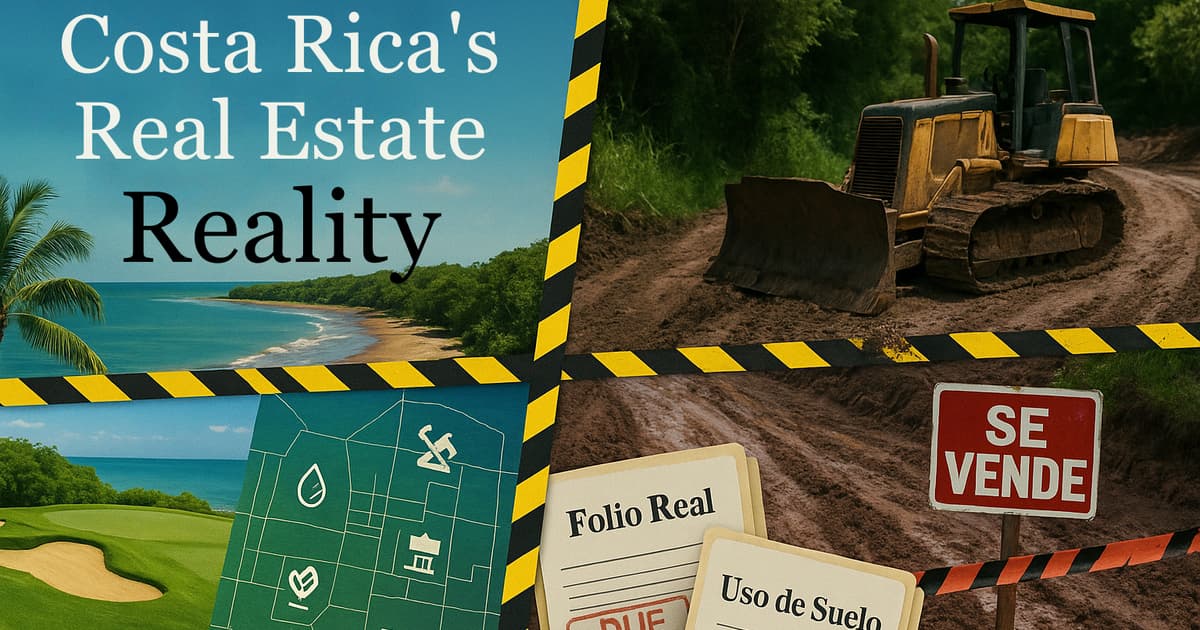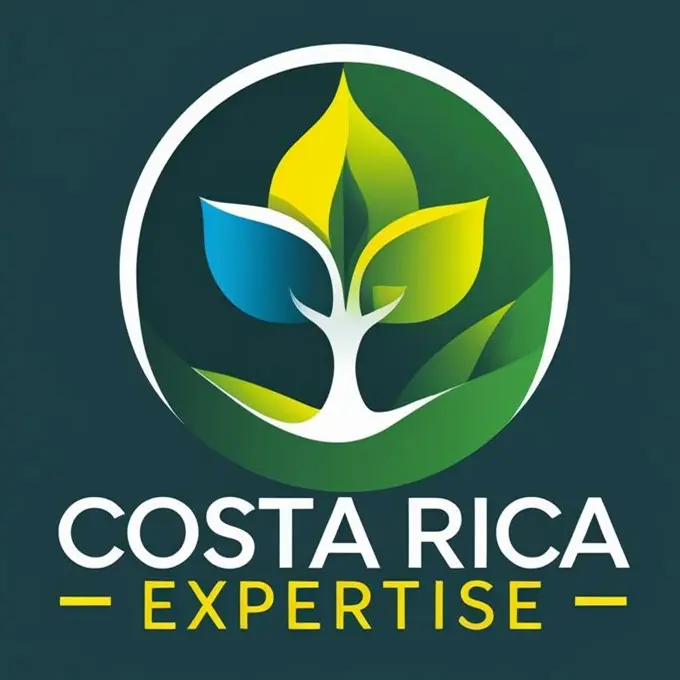2025 Guide to Not Losing Your Shirt in Costa Rica Real Estate
Costa Rica real estate: glossy pitches, real risks. 2025 brings more buyers, stricter SETENA permits, and tricky beachfront concessions. Do due diligence—verify title, zoning, water, access, HOA finances—and use licensed escrow.

The joke still holds some truth in 2025. The dream of paradise makes smart people careless. What used to be a slow-motion mistake is now a high-speed disaster fueled by glossy marketing and instant wire transfers. In 2025, you have a choice: become another statistic in an old joke, or be the savvy investor who thrives. This guide is for the latter.
A Quick Origin Story: How Guanacaste’s Past Shapes Today’s Purchases
In the late 1960s and early 70s, developers carved pasture into dream-lot subdivisions across Guanacaste. Nosara is the canonical example: between 1969–1972, Alan Hutchinson assembled ~1,110 hectares (2,718 acres) from three fincas (farms), marketing to foreigners with visions of golf, tennis, and manicured living. Many bought sight-unseen on irresistible payment plans.
Then the principal vanished. The jungle reclaimed the roads, and owners returned to find their boundary stakes swallowed by green. Decades later, the Nosara Civic Association (NCA) and similar groups are still working to retrofit orderly growth onto that chaotic legacy.
Lesson: Glossy promises fade. Land law and paperwork endure.
What's Changed Since the 70s (And Why It Matters in 2025)
- New Residency Pathways Attract Buyers: The Investor (Inversionista) residency threshold was reduced to USD $150,000 in approved assets (like real estate), expanding the buyer pool. The Digital Nomad Visa also draws remote workers who often become long-stay renters and, later, buyers.
- Institutions Evolved, History Didn’t: The rural land agency that once redistributed territory—ITCO (1961)—became IDA and is today INDER (since 2012). Knowing this lineage helps resolve issues on old titles that reference prior agencies.
- Stricter Environmental Compliance: SETENA (the National Environmental Technical Secretariat) now requires environmental viability studies (Viabilidad Ambiental) for many projects before a municipality can issue construction permits. Skipping this step can tank a deal—or your future build.
- Beachfront is Still Special (and Tricky): Roughly 95% of beachfront lies in the Maritime Zone (Zona Marítimo Terrestre or ZMT) and is held via government concession, not fee-simple title. These concessions come with strict use, term, and nationality restrictions. Due diligence here is a different sport entirely.
The 2025 Costa Rica Real Estate Due-Diligence Playbook
Goal: Verify title, use, buildability, access, water, taxes, and seller reality before you send a cent.
1. Title & Boundary Reality
- Folio Real ** (Title):** In the Registro Nacional (National Registry), confirm ownership, liens (gravámenes), annotations, mortgages, and easements (servidumbres). Your lawyer must provide a certificación literal (a court-admissible, certified copy of the full title that proves its status on the day of issue) and an informe registral (a non-certified summary for quick reference). Never close a deal based on an informe alone.
- Plano Catastrado ** (Cadastral Map):** Ensure the official survey map's boundaries and area match the title and what you see on the ground. If they don’t, budget time and money for a corrective survey. Regularly visiting or securing your property is also crucial to prevent issues related to squatters' rights (usucapión), particularly with undeveloped land.
2. Land Use & Zoning
- Uso de Suelo ** (Land-Use Certificate):** This non-negotiable municipal document confirms what you can legally build (e.g., residential, commercial), the permissible density, and lot coverage. It is a prerequisite for construction permits.
- Plan Regulador ** (Zoning Plan):** Review the local municipal zoning plan for setbacks from roads and rivers, height restrictions, and whether the property is in a protected or risk-prone zone (e.g., landslide, flood).
3. Water, Access, and Utilities
- Water Availability Letter: You must have a certified letter (carta de disponibilidad de agua) from the national water utility (AyA) or the local administrative water association (ASADA). Without it, you cannot get building permits.
- Legal Access: Ensure access is via a public road or a legally registered right-of-way (servidumbre) recorded on the title—not just “the road we’ve always used.”
4. Environmental & Coastal Specifics
- SETENA Viability: If applicable, ask for the environmental viability resolution number and verify its conditions.
- Maritime Zone (ZMT): For concession properties, confirm the concession is current, its term, its permitted use, and that your ownership structure complies with the law. Remember: A concession is a highly regulated, long-term lease from the government. You are a custodian, not a sovereign owner, and your rights can be revoked if you fail to comply with its terms.
5. Developer / HOA / Condo Regime
- Condominium Documents: For condos, review the recorded master deed (finca matriz), bylaws (reglamento), and any registered phasing plans.
- HOA Financials: Check the current budget, delinquency rates, reserve funds, pending lawsuits, and the association's municipal tax status.
6. Money Flow & Contracts
- Escrow: Use a licensed and regulated escrow agent, preferably one supervised by SUGEF (the national financial regulator). This is non-negotiable: Never transfer funds directly to a seller’s personal or corporate account. This is the single biggest red flag for potential fraud.
- Bilingual Purchase Agreement: The contract must reference the title number, plano number, area, and list all encumbrances, deliverables (utilities, roads), deadlines, and remedies for default. Be prepared for closing costs, which typically range from 3% to 5% of the sale price and include taxes, notary fees, and registration fees.
7. Tax Status Verification
- Municipal Taxes (Bienes Inmuebles): Obtain a statement from the municipality confirming property taxes are paid in full. Unpaid taxes constitute a priority lien.
- Luxury Home Tax (Impuesto Solidario): For high-value homes, verify this tax is paid.
- Capital Gains Tax: Be aware that when you eventually sell the property, a capital gains tax (Impuesto sobre Ganancias de Capital) will apply. Understanding this from the start helps in long-term financial planning.
The Five Red Flags That Scream "Walk Away Now"
- "Pre-sale" lots marketed with no Uso de Suelo, no water letter, no SETENA approval, and no legally recorded access.
- Beachfront "titles." If it’s within the first 200 meters of the high-tide line, it’s almost certainly a concession, not fee-simple title. Verify before falling in love.
- Corporate ownership fog. The seller must prove they have legal control of the corporation that owns the property and that the corporation has no hidden labor debts or other liabilities.
- Pressure to wire money quickly to a non-escrow account or an unrelated offshore entity. Hard no.
Building Your A-Team: The Non-Negotiable Professionals You Need
Your single greatest protection is an independent team loyal only to you. Never rely on the seller's or developer's recommendations.
- Your Real Estate Attorney: Choose a reputable, bilingual attorney who specializes in real estate. They are your chief advocate. Vet them by checking their credentials with the Costa Rican Bar Association (Colegio de Abogados y Abogadas) and asking for references from other expats.
- Your Escrow Agent: Insist on an escrow company registered and supervised by SUGEF, the same entity that oversees banks. This ensures your funds are protected by strict financial controls.
- Your Surveyor (Topógrafo): For raw land or properties with unclear boundaries, hire your own surveyor to verify the plano catastrado on the ground. This small expense can prevent million-dollar mistakes.
How to Vet a "Too-Good-to-Be-True" Master-Planned Project
Ask for (and read) these documents before paying a reservation fee:
- Corporate & Land Chain: The corporation's legal standing (personería jurídica), shareholder list, and full title history.
- Maps & Permits: All recorded planos, the Uso de Suelo for the entire project, the SETENA resolution, water availability letters, and registered road servitudes.
- Phasing Proof: Legal documentation showing which phases are officially registered versus which are just "coming soon."
- Budget & Timelines: A clear civil works schedule, utility hookup dates, and contractual penalties if the developer misses deadlines.
- Escrow Instructions: A neutral escrow agreement with staged fund releases tied to verifiable construction milestones.
If the developer claims any of this is "not ready yet," you should walk away—no matter how cinematic the drone video is.
The Bottom Line: Due Diligence is the Foundation of Your Dream
Costa Rica offers world-class opportunities for investment and lifestyle, but it rewards preparation, not assumption. The path to a secure purchase is paved with paperwork, verified by independent professionals, and protected by a healthy dose of skepticism. By treating due diligence not as a burden but as your most powerful tool, you ensure that your investment is sound, your property is secure, and your new life in paradise starts on solid ground.
Do this, and you won’t just avoid the joke—you’ll be the one living the dream.
